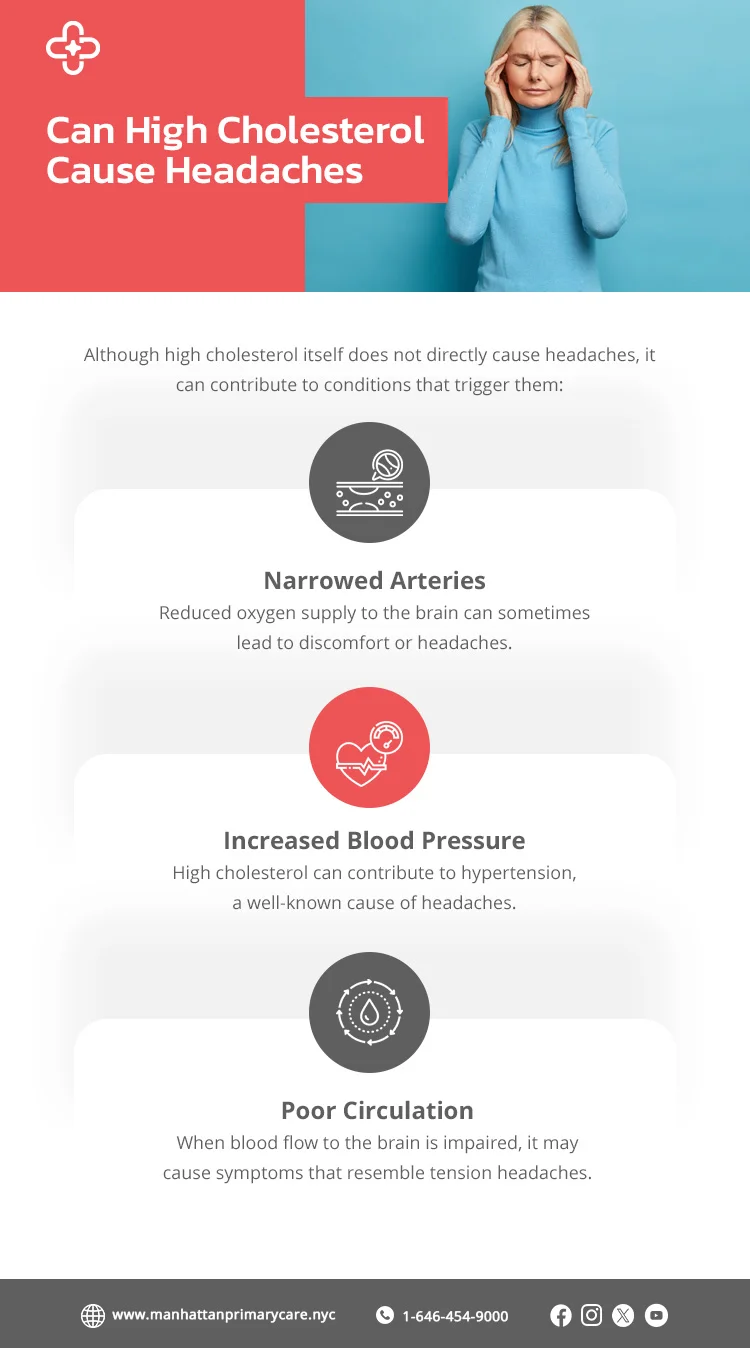You wake up with a pounding headache again. Lately, you’ve also been feeling a little dizzy. Could your cholesterol levels be the reason?
While most people associate high cholesterol with heart disease, many wonder if it could also contribute to headaches or dizziness. Let’s explore whether high cholesterol can cause headaches, how it affects blood flow, and what symptoms might indicate a problem.
What Is High Cholesterol & How Does It Affect Your Body?
High cholesterol is a common yet often misunderstood condition that can silently impact your health over time.
Understanding Cholesterol Levels
Cholesterol is a waxy, fat-like substance that your body needs in small amounts. However, too much cholesterol can lead to health problems. There are three key components to monitor:
- LDL (Low-Density Lipoprotein) – “Bad” Cholesterol: High LDL levels can lead to plaque buildup in the arteries, reducing blood flow.
- HDL (High-Density Lipoprotein) – “Good” Cholesterol: Helps remove excess cholesterol from the bloodstream.
- Triglycerides: A type of fat in the blood that, when elevated, can contribute to cardiovascular disease.
How High Cholesterol Impacts Circulation
When too much cholesterol builds up, it clogs your arteries—kind of like a drain getting blocked. This can make it harder for blood to reach your brain, sometimes causing dizziness or discomfort. This restricts blood flow, increasing the risk of heart disease, stroke, and possibly symptoms like dizziness or headaches.
Can High Cholesterol Cause Headaches?
Although high cholesterol itself does not directly cause headaches, it can contribute to conditions that trigger them:


- Narrowed Arteries (Atherosclerosis): Reduced oxygen supply to the brain can sometimes lead to discomfort or headaches.
- Increased Blood Pressure: High cholesterol can contribute to hypertension, a well-known cause of headaches.
- Poor Circulation: When blood flow to the brain is impaired, it may cause symptoms that resemble tension headaches.
Research Findings on Cholesterol and Headaches
While there is no definitive scientific proof that high cholesterol directly causes headaches, studies suggest that people with cardiovascular risks may experience more frequent headaches, especially if they also have high blood pressure.
Can High Cholesterol Cause Dizziness or Vertigo?
Many people with high cholesterol report feeling lightheaded or dizzy. Why does this happen?
Cholesterol-Related Conditions That Can Cause Dizziness:
- Reduced Blood Flow to the Brain: Narrowed arteries may limit oxygen supply.
- Fluctuating Blood Pressure: Cholesterol imbalances can lead to unstable blood pressure, resulting in dizziness.
- Inner Ear Circulation Issues: Poor circulation can affect the vestibular system, potentially leading to vertigo.
Can High Triglycerides Cause Headaches?
Like LDL cholesterol, high triglycerides can negatively impact circulation and increase inflammation, both of which may contribute to headaches.
- Inflammation in Blood Vessels: May lead to tension headaches or migraines.
- Metabolic Syndrome: A cluster of conditions—including high blood pressure, high blood sugar, and excess body fat—that is linked to migraines.
Other Symptoms of High Cholesterol
High cholesterol is often called a “silent” condition because it doesn’t usually cause noticeable symptoms. However, in cases where complications arise, you may experience:
- Frequent Headaches (if linked to high blood pressure or circulation problems)
- Dizziness or Vertigo
- Chest Pain or Tightness
- Leg Pain or Cramping (due to poor circulation)
- Xanthomas (fatty deposits under the skin)
Can Low Cholesterol Cause Dizziness?
Interestingly, extremely low cholesterol can also cause problems.
- Hormonal Imbalances: Cholesterol is essential for hormone production; too little may disrupt balance.
- Neurological Effects: Some studies suggest that very low cholesterol can be linked to mood disorders and fatigue, which may contribute to dizziness.
How to Manage Cholesterol Levels & Reduce Symptoms
Lifestyle Changes for Healthy Cholesterol
Regular health screenings are essential for early cholesterol detection and prevention of complications like high blood pressure, poor circulation, and headaches.
- Eat a Heart-Healthy Diet: Focus on fiber, omega-3 fatty acids, and healthy fats while reducing saturated and trans fats.
- Exercise Regularly: Improves circulation and boosts HDL (good) cholesterol.
- Manage Stress: Chronic stress can contribute to blood pressure fluctuations.
Medical Treatments for High Cholesterol
If lifestyle changes aren’t enough, doctors may recommend:
- Statins & Other Cholesterol-Lowering Medications: Help lower LDL levels.
- Routine Cholesterol Checks: Monitor levels to prevent complications.
Conclusion:
Managing cholesterol through personalized care and expert guidance, such as the services offered by Manhattan Primary Care, is essential for overall health.
While high cholesterol doesn’t directly cause headaches, it can lead to conditions like high blood pressure, poor circulation, and atherosclerosis, which may contribute to headaches and dizziness.
If you experience frequent headaches or dizziness, check your cholesterol levels and cardiovascular health. A balanced diet, regular exercise, and medical support can help maintain healthy cholesterol levels and prevent complications.
Frequently Asked Questions
Can high blood pressure cause headaches?
Yes, high blood pressure can cause headaches by increasing pressure on blood vessels in the brain. High cholesterol can contribute to high blood pressure, indirectly leading to headaches.
How do you feel when you have high cholesterol?
High cholesterol itself doesn’t cause symptoms, but over time, it can lead to dizziness, fatigue, chest pain, headaches (if linked to high blood pressure), and poor circulation.
Can high cholesterol cause vision problems along with headaches?
Yes, in severe cases, high cholesterol can lead to retinal artery blockages, causing blurred vision or sudden vision loss, sometimes accompanied by headaches.
Does stress increase cholesterol levels, and can that trigger headaches?
Yes, chronic stress raises cortisol levels, which can increase LDL (bad cholesterol). This can lead to poor circulation and high blood pressure, both of which can contribute to headaches.
Can cholesterol medications cause headaches as a side effect?
Yes, some cholesterol-lowering drugs, like statins, can cause headaches due to changes in blood flow, muscle tension, or mild inflammation.
Disclaimer
This blog is for informational & educational purposes only and does not intend to substitute any professional medical advice or consultation. For any health-related concerns, please consult with your physician, or call 911.
